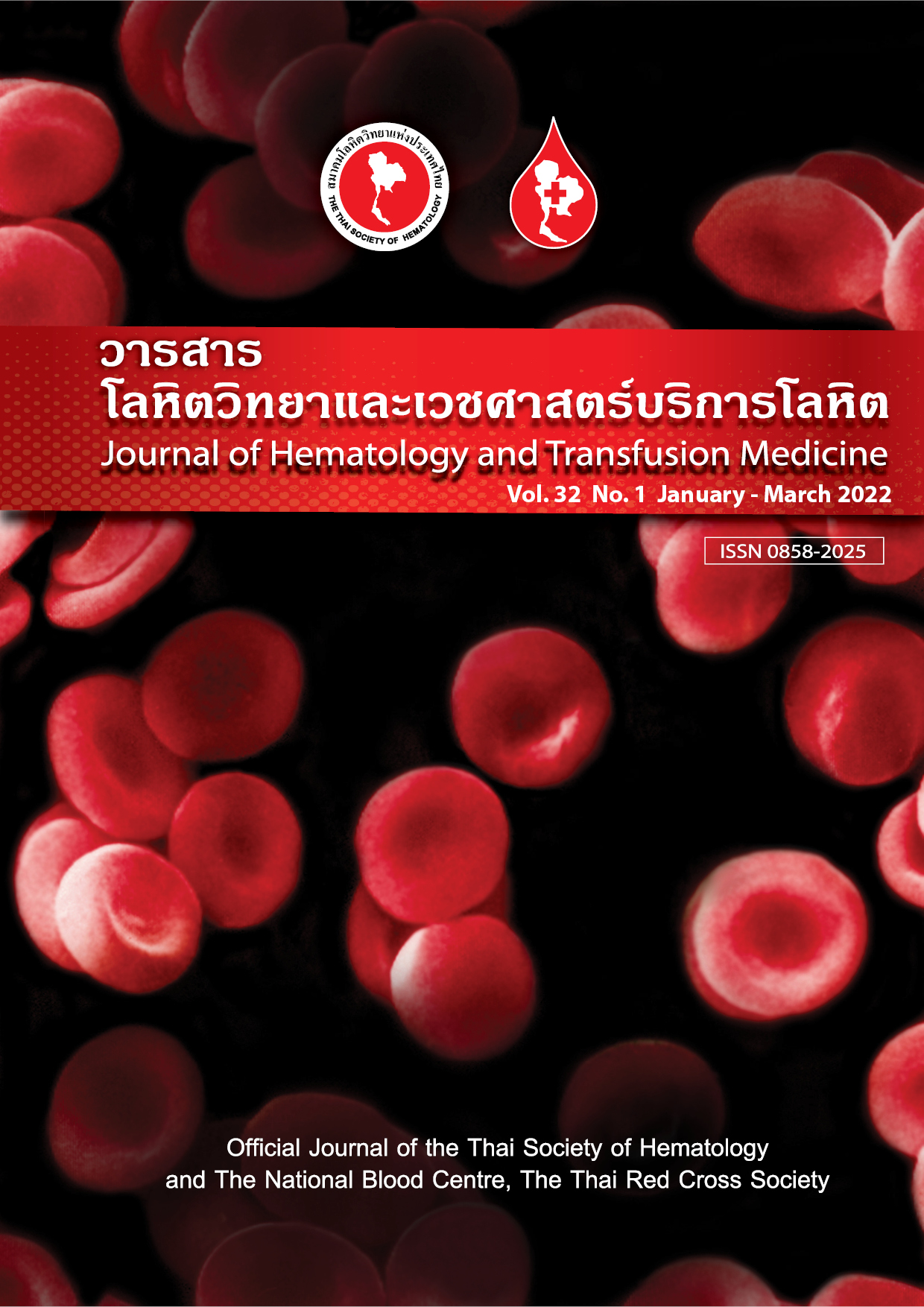กรณีศึกษาที่หายากในประเทศไทย: ผู้ป่วยไข้เลือดออกเดงกีเพศหญิงที่มีภาวะพร่องเอนไซม์ G6PD
คำสำคัญ:
ไข้เลือดออกเดงกี, ภาวะพร่องเอนไชม์ G6PDบทคัดย่อ
ภาวะพร่องเอนไซม์ G6PD ถ่ายทอดทางพันธุกรรมแบบ X-linked recessive ทำให้ระดับของเอนไซม์ G6PD ลดลงหรือมี การทำงานผิดปกติ ส่งผลใหเ้กิดการแตกของเม็ดเลือดแดงได้ในผู้ป่วยโรคไขเ้ลือดออกเดงกี โดยภาวะนี้แสดงอาการในเพศชายได้บ่อยกว่าเพศหญิง ดังนั้นจึงขอเสนอกรณีศึกษาที่หายากดังนี้
ผู้ป่วยหญิงอายุ 22 ปี อาศัยอยู่ในกรุงเทพฯ เข้ารับการรักษาตัวที่โรงพยาบาลเวชศาสตร์เขตร้อน ผู้ป่วยมีอาการหนาวสั่น ปวดศีรษะ ปวดเมื่อยตามตัว รับประทานอาหารได้น้อย มีประจำเดือนวันที่ 3 ปริมาณไม่มาก ผลการตรวจทางห้องปฏิบัติการ พบว่า Dengue NS1 positive, Dengue antibody IgM and IgG positive, WBC count 2,600 cells/mm3, platelet count 17,000 cells/mm3, atypical lymphocytes 9% แพทย์วินิจฉัยว่าผู้ป่วยเป็นโรคไขเ้ลือดออกเดงกี จากผลตรวจปัสสาวะพบว่าค่า urobilinogen 3+ จึงตรวจเอนไซม์ G6PD เพิ่ม ผลตรวจพบว่ามีภาวะพร่องเอ็นไซม์ G6PD ซึ่งส่งผลใหเ้กิดเม็ดเลือดแดงแตกได้เมื่อมีการติดเชื้อไวรัสเดงกี
Downloads
เอกสารอ้างอิง
เอกสารอ้างอิง
Tanphaichitr VS, Chonlasin R, Suwantol L, Pung-Amritt P, Tachavanich K, Yogsan S, et al. Effect of red blood cell glucose-6-phosphate
dehydrogenase deficiency on patients with dengue hemorrhagic fever. J Med Assoc Thai. 2002;85(Suppl 2):S522-9.
Natesirinilkul R, Tantiworawit A, Charoenkwan P. Clinical course of dengue in patients with thalassaemia Paediatr Int Child Health. 2013;33:32-6.
Beutler E. Glucose-6-phosphate dehydrogenase deficiency: a historical perspective. Blood. 2008;111:16-24.
Francis RO, Jhang JS, Pham HP, Hod EA, Zimring JC Spitalnik SL. Glucose-6-phosphate dehydrogenase deficiency in transfusion medicine; the unknown risks. Vox Sang. 2013;105:271-82.
Nkhoma ET, Poole C, Vannappagari V, Hall SA, Beutler E. The global prevalence of glucose-6-phosphate dehydrogenase deficiency: a systematic review and meta-analysis. Blood Cells Mol Dis. 2009;42:267-78.
Kitti Torcharus. Glucose-6-phosphate dehydrogenase deficiency (G-6-PD). The Thai Society of Hematology [Internet]. 2021. [cited 2021 Aug 10]. Available from: http://tsh.or.th/Knowledge/Details/43.
Hecker PA, Lionetti V, Ribeiro RF, Jr., Rastogi S, Brown BH, O’Connell KA, et al. Glucose-6-phosphate dehydrogenase deficiency increases redox stress and moderately Accelerates the development of heart failure. Circ Heart Fail. 2013;6:118-26.
Luzzatto L, Seneca E. G6PD deficiency: a classic example of pharmacogenetics with on going clinical implications. Br J Heamatol. 2014;164:469-80.
WHO Working Group. Glucose-6-phospate dehydrogenase deficiency. Bull World Health Organ. 1989;67:601-11.
Al-alimi AA, A.Ali S, Al-Hassan F, et al. Dengue virus type 2 (DENV2)- induced oxidative responses in monocytes from Glucose-6-phosphate dehydrogenase (G6PD)-deficient and G6PD normal subjects. PLOS Neglected Tropical diseases. 2014;8:1-9.
ดาวน์โหลด
เผยแพร่แล้ว
ฉบับ
ประเภทบทความ
สัญญาอนุญาต
ลิขสิทธิ์ (c) 2022 วารสารโลหิตวิทยาและเวชศาสตร์บริการโลหิต

อนุญาตภายใต้เงื่อนไข Creative Commons Attribution-NonCommercial-NoDerivatives 4.0 International License.



